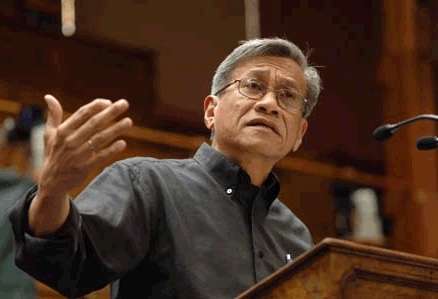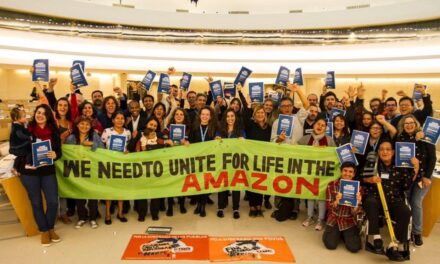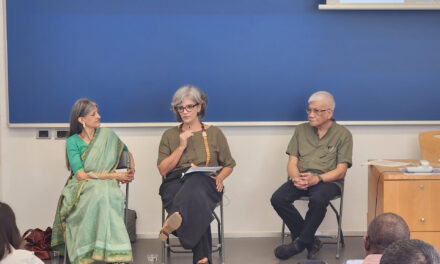By Walden Bello*
(Speech at meeting of international social movements, Hotel Trang, Bangkok, August 31, 2012.)
This July was the hottest July in the United States ever since they started keeping records. In India, the monsoon rains are long delayed, resulting in the country’s second drought in four years. Triple digit temperatures in New Delhi and other cities have already provoked the worst power outages in the country’s history and the expected bad harvest is likely to slice at least five per cent from GDP growth. In Beijing, which usually suffers from a shortage of water, a storm on July 21 resulted in the worst flooding since records began to be kept in 1951, according to the Economist. Meantime, in the Philippines, a protracted “rainstorm with no name”—as many people termed it– that persisted for over a week plunged Metropolitan Manila into a watery disaster that is probably the worst in recent history.
The New Normal
It’s climate change, and the head of the Philippine government’s environment department captured the nature of nature’s wrath when he said that the “new normal” in our climate is unpredictable weather owing to the uncontrolled rise in the globe’s mean temperature due to greenhouse gas (GHG) emissions. If there is any doubt that the abnormal is now the norm, remember that this is shaping up to be the second straight year that non-stop rains have wreaked havoc in Southeast Asia. Last year, the monsoon season brought about the worst flooding in Thailand’s history, with waters rushing down from the north of the country engulfing even Bangkok, affecting over 14 million people, damaging nearly 7000 square miles of agricultural land, disrupting global supply chains of transnationals with subsidiaries in the country, and bringing about what the World Bank estimated to be the world’s fourth costliest disaster ever.
Perhaps the most frustrating thing about the unceasing rainstorms two weeks ago is that we Filipinos could do little to prevent them. We could have made them less calamitous by resettling informal settlers away from the floodways to Manila Bay and reforesting the hills and mountains that border the Metropolitan area. We could have passed the Reproductive Health Bill much earlier and propagated family planning to reduce the human impact on the upland, rural, and urban environments. We could have, in short, taken measures to adapt to changing climate patterns. But to prevent the fundamental shifts in regional and global climate was something we could not do. This is the dilemma of most countries in the South: we are victims and our weapons are few and limited.
The Global Stalemate
As many of you know, there is very little progress at all in the climate negotiations, and here the blame lies first and foremost with the governments of the North. The US Congress is populated by Republican Party climate skeptics who continue to believe, against all evidence, that climate change is a figment of the liberal imagination and have prevented the passage of what is already a weak climate bill. The European Union has committed to curbing greenhouse gas emissions, but this is to be accomplished largely through weak or unrealistic containment measures like carbon trading or technofixes like carbon sequestration and storage, not by moderating economic growth or reducing consumption, which remains the principal engine of greenhouse gas emissions. Currently, with their economies stalled and desperately needing to get restarted owing to the financial crisis, curbing greenhouse gas emissions has very low priority in the agenda of European leaders.
Unfortunately, the North-South dimension has added a deadly dynamic to this process, as the so-called emerging capitalist economies of the South, notably China, Brazil, and India, make their claims to their share of ecological space to grow even as the capitalist economies of the North continue to refuse to give up any of the vast ecological space they now occupy and exploit. China is now the world’s biggest contributor of greenhouse gases, but the basis of its refusal to entertain mandatory limits to its greenhouse gas emissions is that its accumulated emissions have, historically, been quite low, standing at some 9 per cent of the historical total.
The refusal of the North to curb high consumption and the effort by the big emerging economies to reproduce the Northern consumption model lies at the root of the deadlock in the climate change negotiations—one symbolized by the failure of the United Nations-sponsored talks in Copenhagen in 2009 and Durban in 2011 to agree on the contours of a successor agreement to the Kyoto Protocol.
What was agreed upon in Durban was that governments would submit their offers for GHG reductions by 2015, but these would be implemented only in 2020. But by then, it will already be too late, say many experts, since countries will already be locked into a high carbon development path. Scientists say that given the absence of mandatory emissions limits in the next few years, the world is on track to pass the 2 degree Celsius gain to which they would like to confine the rise in global mean temperature, and is already on a trajectory of a 4 to 5 degree temperature rise, which would be nothing short of calamitous in its consequences. Reflecting what many see as the maddeningly nonchalant attitude of Washington, Todd Stern, a US climate official, recently urged governments to give up the 2 degrees rise target and sought a “more flexible” international agreement based on voluntary targets. This can only provide the governments of countries on a high growth path an excuse to postpone making commitments, if not junk mandatory reductions altogether.
The Global Economic Crisis
Let me now turn to the global economic crisis that is unfolding alongside the environmental crisis.
2012 is year 5 of the Great Recession. In the United States and Europe, the heady years of globalization, when seemingly inexhaustible credit allowed the middle classes access to an unimaginable range of goods, are fast fading from the popular memory. With the economies of the US and Europe barely registering growth, the great engine of capitalism appears palpably to have downshifted. Indefinitely.
I will not dwell on the causes and dynamics of the economic crisis. Let me just say that it is very hard to see growth returning soon to the United States and Europe. Indeed, my sense is that by election day in the US, the unemployment rate will be back to 9 per cent or more, and the election of a Republican president dedicated to cut spending will guarantee a longer period of stagnation. As for Europe, the devastation of Germany’s export markets in Southern Europe by austerity programs promoted by the German government will make itself felt in a slowdown of growth in Germany itself.
It is perhaps only recently that we have come to realize that what we are going is a crisis of globalization, that is, one that will spell the end of the so-called second era of globalization that began in the 1980’s.
What do I mean? In late 2008 and 2009, the recession in Europe and the US brought down growth rates in East Asia, but this was only for about a year. By 2010, East Asia and the big “newly emerging economies” known as the BRICs (Brazil, Russia, India, China, South Africa) appeared to have recovered. They were regarded as bright spots in the global economy, exhibiting resiliency and growth even as the North stagnated. Indeed, to economists like Nobel laureate Michael Spence, “With growth returning to pre-2008 levels, the breakout performance of China, India, and Brazil are important engines of expansion for today’s global economy.”[i] In a decade, the share of global GDP by the emerging economies would pass the 50 per cent mark, he predicted. Much of this growth would stem from “endogenous domestic-growth drivers in emerging economies, anchored by an expanding middle class.”[ii] Moreover, as trade among the BRICs increased, the future of emerging economies is one of reduced dependence on industrial-country demand.”[iii]
Recent trends, however, appear to show that the idea that the fate of the BRICs had become decoupled from that of the US and Europe was an illusion. 2012 seems to be the year the emerging economies will yield to the turbulent waves emanating from the sinking economies of the North. Economies are slowing down, with India’s growth 2011 falling by five per cent relative to 2010. Brazil’s growth was under three per cent—lower, as the Economist noted, than sickly Japan’s.[iv] China’s first quarter growth in this year plunged to 8.1 per cent, its slowest pace in three years. The main reason appears to be the continued great dependence of these economies on Northern markets and their inability to institutionalize domestic demand as the key engine of the economy.
Let me focus on China. Being the world’s second largest economy, China’s downshifting is particularly alarming. In 2008, in response to the crisis, China launched a $585 billion stimulus program to enable the domestic market to make up for the loss of export demand. Achieving some success at first, China, however, reverted back to export-led growth oriented towards the US and European markets. The reason for the retreat was explained by the respected Chinese technocrat Yu Yong Ding:
With China’s trade-to-GDP ratio and exports-to-GDP ratio already respectively exceeding 60 percent and 30 percent, the economy cannot continue to depend on external demand to sustain growth. Unfortunately, with a large export sector that employs scores of millions of workers, this dependence has become structural. That means reducing China’s trade dependency and trade surplus is much more than a matter of adjusting macroeconomic policy.[v]
The retreat back to export-led growth, rather than merely a case of structural dependency, reflected a set of interests from the reform period that, as Yu put it, “have morphed into vested interests, which are fighting hard to protect what they have.”[vi] The export lobby, which brings together private entrepreneurs, state enterprise managers, foreign investors, and government technocrats, remains the strongest lobby in Beijing.
Indeed, according to Yu, only crisis beckoned in the future since China’s “growth pattern has now almost exhausted its potential.”[vii] The economy that most successfully rode the globalization wave, China “has reached a crucial juncture: without painful structural adjustments, the momentum of its economic growth could suddenly be lost. China’s rapid growth has been achieved at an extremely high cost. Only future generations will know the true price.”[viii]
To sum up, I do not see the North emerging anytime soon from stagnation in the near and medium term. Asia will soon dragged into this maelstrom, and the world is headed for a depression that could be worse than that of the 1930’s.
The Failure of Establishment Solutions
With the fatal intersection of the global ecological crisis and the global economic crisis, the establishment has run out of solutions.
With the eruption of the financial crisis in 2008, two approaches from the establishment have competed to address the crisis.
In the immediate aftermath of the crisis, the neoliberal University of Chicago Nobel laureate Robert Lucas said, “Every economist is a Keynesian in the foxhole.” By 2010, however, the neoliberals had left the foxhole. But their solution was no solution inasmuch it did not address the issue of ending unemployment and restarting growth. From the neoliberal view, a deepening of the crisis was, in fact, part of the natural order of things, whereby the “excesses” and distortions created by government intervention were wrung out of the system.
What the neoliberals managed to do was to change the narrative or the discourse, playing on the middle class’ traditional distrust of government, deficit spending, and taxes. Here they were supported by the propaganda machinery of Wall Street, which sought to move the public focus away from financial reform. Instead of unemployment and stagnation in the short and medium term, the real problem they pointed to was the debt and the deficit. Massive deficits financed by debt, they said, would ensure a future of debt slavery for future generations.
Whether in the United States or in Europe, this road offers nothing to the people but more unemployment and stagnation, and it is hard to see neoliberalism regaining its ideological legitimacy under these conditions.
Let me now turn to the Keynesians, who sought to step in the driver’s seat with the eruption of the crisis in 2009. Keynesians like Paul Krugman saw unemployment as the problem, and it was to be banished by massive deficit spending, low interest rates, and loose money policies. Criticism of Keynesianism, however, not only came from the right but also from progressive quarters, who saw its focus on growth by stimulating consumption as simply a short-term solution bereft of a transformative vision for restructuring the economy along lines of greater equity and democracy. In the view of its critics on the left, the problem of the new Keynesianism it its adherence to the framework of monopoly capitalism, which rests fundamentally on deriving profit from the exploitative extraction of surplus value from labor, is driven from crisis to crisis by inherent tendencies toward overproduction, and tended to push the environment to its limits in its search for profitability.
At both the national and the global arena, the new Keynesianism promoted a new class compromise accompanied by new methods to contain or minimize capitalism’s tendency toward crisis. Just as the old Keynesianism and the New Deal stabilized national capitalism, the historical function of the new Keynesianism is to iron out the contradictions of contemporary global capitalism and to relegitimize it after the crisis and chaos left by neoliberalism. In the view of many progressives, the new Keynesianism old and new was, at root, about social management.
Progressive Alternatives
With the discrediting of neoliberalism and the limitations of Keynesianism, other quarters have seen the crisis as providing the opportunity to move from mere firefighting to proposing more fundamental economic restructuring.
Radical environmentalists have located the crisis in the much broader context of a growth-oriented, fossil-fuel addicted mode of production. To analysts like Richard Heinberg, the intersection of the financial collapse, economic stagnation, global warming, the steady depletion of fossil fuel reserves, and agriculture reaching its limits is a fatal one. It represents a far more profound crisis than a temporary setback on the road to growth. It portends not simply the end of a paradigm of global growth driven by the demand of the center economies. It means the “end of growth” as we knew it. It is, in short, the Malthusian trap, though Heinberg understandably avoids using the term.
The gyrations of the finance economy, he said, do not simply stem from the dynamics of capital accumulation but from an all-encompassing ecological disequilibrium:
Perhaps the meteoric rise of the finance economy in the past couple of decades resulted from semi-conscious strategy on the part of society’s managerial elites to leverage the last possible increments of growth from a physical, resourced based economy that was nearing its capacity. In any case, the implications of the current economic crisis cannot be captured by unemployment statistics and real estate prices. Attempts to restart growth will inevitably collide with natural limits that simply don’t respond to stimulus packages or bailouts. … Burgeoning environmental problems require rapidly increasing amounts of efforts to fix them. In addition to facing limits on the amount of debt that can be accumulated in order to keep those problems at bay, we also face limits to the amounts of energy and materials we can devote to these purposes. Until now the dynamism of growth has enabled us to stay ahead of accumulating environmental costs. As growth ends, the environmental bills for the last two centuries of manic expansion may come due just as our bank account empties.[ix]
The next few decades, Heinberg asserts, will be marked by a transition from expansion to contraction, a process “characterized by an overall contraction of society until we are living within Earth’s replenishable budget of renewable resources, while continually recycling most of the minerals and metals we continue to use.”[x] The future points in the direction of decentralized eco-communities marked by more manageable participatory decisionmaking, powered by low-energy systems, reliant on cooperatives for production and other economic functions, dependent on organic farming for food, and using non-debt-based currencies for exchange.
Alternatives from the South
It is not only radical environmentalists in the North that have taken up the challenge of promoting a vision of radical economic restructuring. One of the best known is Via Campesina’s paradigm of Food Sovereignty, which offers a comprehensive program of social and economic transformation.
Allow me to dwell at some length on Food Sovereignty, since it is one of the more daring efforts to provide a comprehensive alternative to neoliberalism. As I understand it, the key pillars of food sovereignty are the following:
First, the goal of agricultural policy should be food self sufficiency, wherein the country’s farmers produce most of the food consumed domestically—a condition not covered by the concept of “food security,” which US corporate representatives have defined as the capacity of fill a country’s food needs through either domestic production or imports. The radical implications of this premise are noted by Jennifer Clapp: “By removing farmers from the global trading system altogether, the food sovereignty movement focuses on local needs and local food markets, thus freeing smallholders from the unfair and unbalanced trade rules that are upheld by the WTO Agreement on Agriculture.”[xi]
Second, a people should have the right to determine their patterns of food production and consumption, taking into consideration “rural and productive diversity,” and not allow these to be subordinated to unregulated international trade.[xii]
Third, production and consumption of food should be guided by the welfare of farmers and consumers, not the needs of profit of transnational agribusiness.
Fourth, national food systems must produce “healthy, good quality and culturally appropriate food primarily for the domestic market,”[xiii] and avoid what Bove has called malbouffe or internationally standardized or “junk food.”[xiv]
Fifth, a new balance must be achieved between agriculture and industry, the countryside and the city, to reverse the subordination of agriculture and the countryside to industry and urban elites, which has resulted in a blighted countryside and massive urban slums of rural refugees.
Sixth, the concentration of land by landlords and transnational firms must be reversed and equity in land distribution must be promoted through land reform, though access to land should be possible beyond individual ownership, allowing more communal and collective forms of ownership and production that promote a sense of ecological stewardship.
Seventh, agricultural production should be carried out mainly by small farmers or cooperative or state enterprises, and the distribution and consumption of food should be governed by fair pricing schemes that take into consideration the rights and welfare of both farmers and consumers. Among other things, this means an end to dumping by transnational firms of subsidized agricultural commodities, which has artificially brought down prices, resulting in the destruction of small farmers. It would also mean, according to activist scholar Peter Rosset, “a return to protection of the national food production of nations…rebuilding national grain reserves…public sector budgets, floor prices, credit and other forms of support” that “stimulate the recovery of [countries’] food production capacity.”[xv]
Eighth, industrial agriculture based on genetic engineering and the original chemical-intensive Green Revolution should be discouraged because monopoly control over seeds advances the corporate agenda and because industrial agriculture is environmentally unsustainable.
Ninth, traditional peasant and indigenous agricultural technologies contain a great deal of wisdom and represent the evolution of a largely benign balance between the human community and the biosphere. Thus evolving agro-technology to meet social needs must have traditional practices as a starting point rather than considering them obsolete practices to be overthrown.
As Philip McMichael puts it, “food sovereignty in theory and practice represents a political, ecological, and cultural alternative to a ‘high modernist’ corporate agriculture premised on standardized inputs and outputs and serving a minority of the world’s population…[T]he principle of food sovereignty embodies neither a return to traditional agriculture, nor a return to a bucolic peasant culture—rather, it is a thoroughly modern response to the current neoliberal conjuncture, which has no sustainable solutions to its thoroughly modern problems.”[xvi]
I have highlighted Via Campesina’s Food Sovereignty paradigm, but all of us are parts of movements that are in search of alternatives to a global capitalism that has reached a dead end, either in its neoliberal guise or its Keynesian form. Let me just say that while our efforts may be different when it comes to detail, most of them share the same fundamental principles. Shared principles of alternative economics do exist, and they have already substantially emerged in the struggle against and critical reflection over the failure of centralized socialism and neoliberal capitalism. What are the principles that our efforts share?
First of all, they aim at enhancing ecological equilibrium, democracy, and equality while promoting the principle of subsidiarity or locating the locus of production and decisionmaking at the lowest level where it can be done with minimal economic cost.
Second, they seek to move beyond the economics of narrow efficiency, in which the key criterion is the reduction of unit cost, never mind the social and ecological destabilization this process brings about. Rather, they promote an “effective economics,” which strengthens social solidarity by subordinating the operations of the market to the values of equity, justice, and community by enlarging the sphere of democratic decision making. To use the language of the Karl Polanyi in his book The Great Transformation, our paradigms are about “re-embedding” the economy in society, instead of having society driven by the economy.[xvii]
Finally, our approaches maintain that a “one size fits all” model like neoliberalism or centralized bureaucratic socialism is dysfunctional and destabilizing. Instead, diversity should be expected and encouraged, as it is in nature.
Conclusion
Let me just conclude by saying that we stand today at that fatal intersection of the ecological crisis and the economic crisis, two crises that are global in nature. The two great ideologies of the establishment, neoliberalism and Keynesianism, are engaged in a titanic struggle with each other, but both fail to address the fundamentals of this dual crisis which lie in the inherent dynamics of capitalism, which is dependent on constant expansion and consumption. At the same time, global negotiations to address the climate crisis are stalled, showing up the flaws of the North-dominated multilateral system. At this conjuncture, international civil society, of which we are a part, is being challenged to step into the vacuum. We must step up to the plate, end the stalemate among the states, and come up with the alternatives to pull the planet from the debacle to which global capital has plunged it.
I thank you.
[i] Michael Spence, The Next Convergence: the Future of Economic Growth in a Multispeed World (Crawley, Western Australia: University of Western Australia, 2011), p. 187.
[ii] Ibid., p. 188.
[iii] Ibid.
[iv] “Start the engines, Angela,” The Economist, June 9, 2012, http://www.economist.com/node/21556577?scode=3d26b0b17065c2cf29c06c010184c684
Jun 9th 2012
[v] Yu Yongding, “A different road forward,” China Daily, Dec 23, 2010, http://www.chinadaily.com.cn/opinion/2010-12/23/content_11742757.htm
[vi] Ibid.
[vii] Ibid.
[viii] Ibid.
[ix] Richard Feinberg, The End of Growth (British Columbia: New Society Publishers, 2011), p. 152.
[x] Ibid., p. 284.
[xi] Jennifer Clapp, Food (Cambridge: Polity Press, 2012), p. 175.
[xii] Via Campesina, “Food Sovereignty and International Trade,” Position paper approved at the Third International Conference of the Via Campesina, Bangalore, India, October 3-6. Cited in Annette Desmarais, La Via Campesina and the Power of Peasants (London: Pluto Press, 2007), p. 34.
[xiii] Quoted in Desmarais, ibid.
[xiv] Jose Bove, “A Farmers’ International?,” New Left Review, No. 12 (Nov-Dec 2001), http://www.mewleftreview.org/A2358.
[xv] Peter Rosset, quoted in Philip McMichael, “”Food Sovereignty in Movement: the Challenge to Neo-Liberal Globalization,” draft, Cornell University, 2008.
[xvi] McMichael.
[xvii] Karl Polanyi, The Great Transformation (Boston: Beacon, 1957), pp. 68-76.










